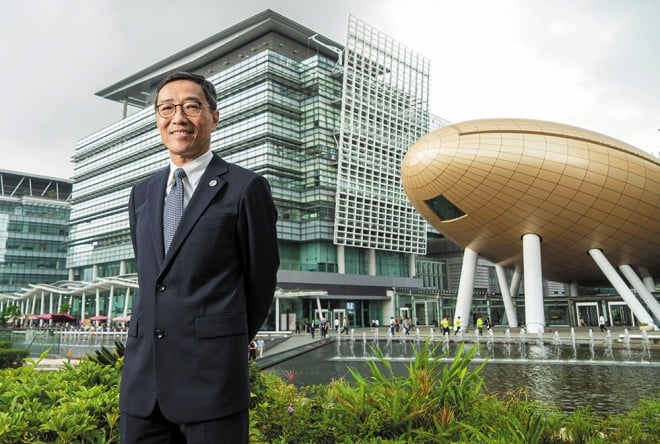
Making it Real
Even with a great concept and talented individuals, getting a startup off the ground is hard work. Albert WONG, Chief Executive Officer of HKSTP explains how they help startups turn ideas into market-ready products.
[Sponsored Article]
For budding entrepreneurs, one of the first lessons to learn is that there are a lot of ideas for sure-fire winners and killer apps out there, and most of them end up going nowhere. What typically makes the difference between success and failure is a clear-sighted understanding of the realities of the business world, and a willingness to listen to practical advice at pivotal moments.
Would-be entrepreneurs need to have more than a good idea to succeed, says Albert Wong, Chief Executive Officer of the Hong Kong Science and Technology Parks Corporation (HKSTP). “All startups need to have talent behind them, some funding, and a commercial application. They must be more than an idea or a piece of technology,” says Wong, whose mission is to provide a vibrant ecosystem to support new ventures and promote innovation. “Hong Kong has very good universities, and a lot of work is carried out in laboratories. We help to commercialize these ideas and bring them to fruition, so people can realize their dreams,” Wong says.
Difference between success and failure
HKSTP runs a series of incubation programs geared to the needs of startups. These programs focus on new technologies, disruptive business models, and the biomedical field. Nascent companies admitted to a program can expect assistance with product development, finding a place to work, networking events, funding applications, and in some cases, generous grants with no strings attached.
One key aim, Wong notes, is to take a startup from “40,000 feet” to ground level by ensuring the founders understand corporate structures, know how to find investors, and can identify the needs of consumers. The initial step of validating the proposed product or concept includes a full review of likely regulatory issues, target markets, and possible industry applications. But it also goes into the nitty-gritty of assessing plans for market entry, promotion, pricing, and after-sales service.
“We often tell candidates from a lab environment that they have the greatest idea in the world, but they still need to change it,” Wong says. “We advise them whether the business plan is sound, look at the management, and consider whether candidates need to change course or pivot. All this can make the difference between success and failure. Some people stick to their conviction and are resistant to change, but to succeed, humility is equally important and you must be ready to accept new ideas and listen to other people,” he says.
These programs look to be working. There are now over 320 companies in the incubation programs at any one time, while about 650 “graduates” have already moved on to play a role in the wider economy. In terms of talent, the HKSTP community is 13,000-strong, with about 9,000 participants dedicated to R&D work. Today, 70 companies out of a total of 760 companies in the Science Park are formed by HKUST alumni. They represent a regular stream of graduate-led and faculty-led projects which are aiming for long-term commercial viability.
“Around 60 to 70 per cent of startups come from universities,” Wong says. “Typically, if a proposition is science-based or technology-based, the founders approach HKSTP. They give us their milestones for fundraising or development for the next two to four years when we admit them. Our team will review the milestones every other month. We are not shareholders. We are like teachers or tutors who point participants in the right direction,” Wong says.
Most proposals fall into one of three groups. There are business-model innovations, usually based on the principle of the “sharing” economy, which are often hard to judge. There are tech ideas for apps, electronic products or renewable energy, which require further research and development. Then there are biotech projects centred on anything from DNA sequencing to diagnostics and stem-cell breakthroughs. Biotech projects involve more risk, regulatory approval, and lab work, and consequently have significantly longer timescales.
Wong says there could be greater emphasis on areas like fintech and AI (artificial intelligence) in the future, although the same core principles will still apply. “I’m not a bank, so startups must have seed money, and some skin in the game,” Wong says. “You can’t start with zero money. You must find a good investor who believes in you. Convincing investors and devising industry applications is the ultimate test,” he says.
The power of keep improving
For that reason, HKSTP makes a point of teaching startups how to make presentations to potential investors when they want to offer shares or attract private equity. It’s important for startups to keep improving or reinventing their product. As an example, the successful Angry Birds game, created by the Finnish company Rovio Entertainment, is said to be the 35th iteration of the idea.
“The technology part is not the biggest worry, and it is taken for granted,” Wong says. “Our concern is the commercial problems of fundraising, cash flow, pricing and distribution, knowing how to get to market, and knowing how to get recommendations for your product.”
“I also tell participants that if you have more than one owner, the number-one challenge is to figure out your shareholder agreement. When you’re going through tough times you will stick together, but problems can arise when you start making money,” Wong says.

About the Hong Kong Science and Technology Parks Corporation
• Established as a statutory body in 2001 by the HKSAR Government
• Home to over 750 tech companies
• 5 major technology clusters – Biomedical Technology, Electronics, Green Technology, Information and Communications Technology, and Material and Precision Engineering
